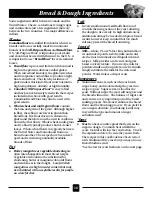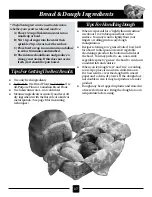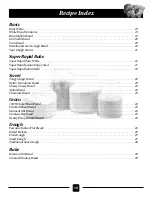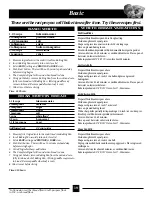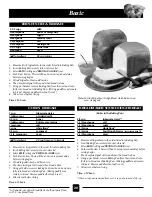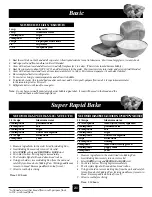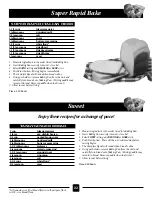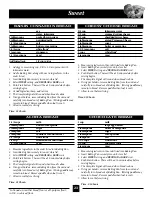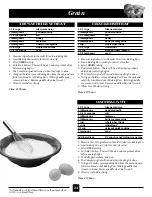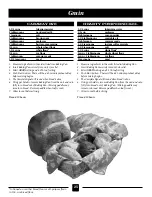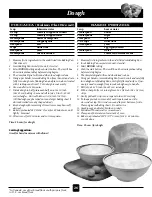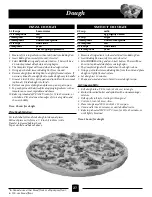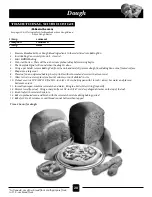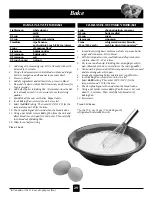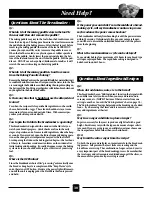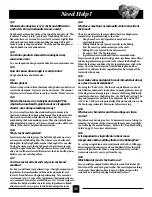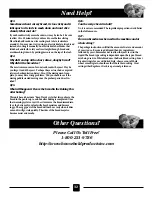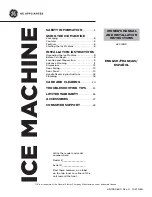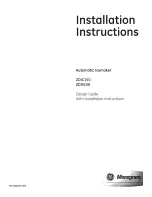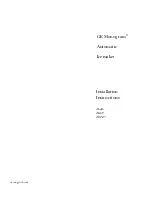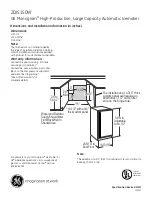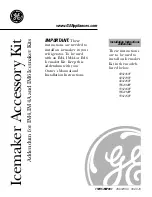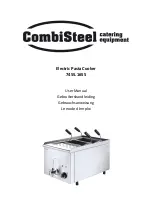
30
Need Help?
Questions About The Breadmaker :
Q1:
What do I do if the mixing paddle stays in the loaf? Is
this normal? How do I remove the paddle?
The mixing paddle may stay in the loaf when the bread is removed
from the bread pan. This happens because the crust forms around
the paddle during the baking process. Allow the loaf to cool before
removing the mixing paddle (the inside of the loaf is VERY HOT-
you may burn yourself if you try to remove the paddle too soon.)
When the loaf has cooled, use a plastic spoon or rubber spatula to
remove the paddle. Gently insert the spoon/spatula into the bot-
tom of the loaf and loosen the crust from the paddle. Pull the pad-
dle out. DO NOT use a sharp object (knife, metal utensil) as it will
scratch the non-stick coating on the mixing paddle.
Q2:
What do I do if the mixing paddle is hard to remove
from the Baking Pan after baking?
Remove the Baking Pan from the unit and fill with hot water allowing it
to soak for 30 minutes to an hour.Next,pour out the water,turn the Pan
over and wiggle the Paddle loose while holding the winged coupling on
the bottom of the Pan.Using a toothpick or soft kitchen brush clean out
any dough left in the hole of the Paddle.
Q3:
Is there any time that I should not use the delayed start
feature?
Yes, when the recipe calls for perishable ingredients such as milk,
cheese, buttermilk, or eggs. These foods should not stay at room
temperature for an extended period of time. With some recipes,
you may substitute powdered milk.
Q4:
Can I open the lid while the breadmaker is operating?
This breadmaker is designed with a window in the lid to let you
watch your bread’s progress. Quick checks are fine in the early
stages of operation and of course to add ingredients when the beep-
er sounds. However, don’t open the lid too frequently during opera-
tion as the change in air temperature may cause the loaf to fall.
Avoid opening the lid once the baking period begins—the last hour
of the cycle. Sometimes condensation forms on the window after
initial mixing and kneading. It usually disappears once the baking
cycle starts so you should be able to get a clear view of your rising
loaf.
Q5:
Where is the OFF button?
Since the breadmaker shuts off its “processing” automatically once
the bread or dough cycle is complete and the “Keep Warm” cycle
ends, there is no OFF button. However, the power light will remain
on until the unit is unplugged or the Start/Reset button is pressed
and held.
Q6:
If the power goes out while I’m in the middle of a bread-
making cycle, will my Breadmaker continue to process
my bread once the power comes back on?
The breadmaker will only finish making bread if the power returns
within 20 seconds. Unfortunately, if your power outage is longer,
you will have to discard the unfinished bread and start the process
from the beginning.
Q7:
What is the maximum time a cycle can be delayed?
You can delay baking for a maximum of 13 hours for any bread type
setting except rapid bake. The rapid bake setting is designed to
bake bread in under 2 hours.
Q8:
When do I add raisins, nuts, etc. to the bread?
This breadmaker has an “Add-Ingredient” function that signals with
an audible tone to let you know when you may add raisins, nuts,
caraway seeds, etc. (
NOTE:
The time of the tone varies from one
setting to another. Consult the “Add-Ingredient” chart on page 10.)
The “Add-Ingredient” feature helps reduce the breaking up of added
foods . If you are using the Timer and it is more convenient, you
may add ingredients at the start.
Q9:
May I use a sugar substitute in place of sugar?
Sugar is necessary for the yeast to produce a light loaf with a good
height. Results may vary with the type and amount of sugar substi-
tute used. If you are going to use an artificial sweetener choose one
that is aspartame based rather than saccharin based.
Q10:
May I omit the salt or sugar from the recipe?
No, both the sugar and salt play an important role in the bread mak-
ing process. Salt prevents the yeast from over-reacting and the
bread from over-rising. The combination of sugar, salt, and yeast is
a very important part of the bread making process. Remember that
the total sugar and salt amounts are divided among all the slices, so
the amount of sugar and salt per serving is small.
Questions About Ingredients/Recipes :

